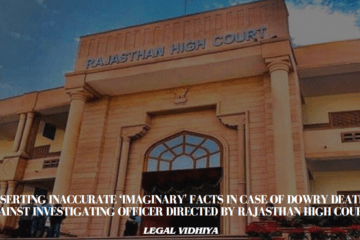
In a significant ruling, the Supreme Court of India, in its, has addressed the pivotal issue of whether directors who have resigned from their positions can be held liable for negotiable instruments failing realization. The judgment pertains to Criminal Appeal No. 6905 & 7050 of 2022, which arose from Special Leave Petitions (Criminal) No. 6905 and 7050 of 2022.
The case involved Rajesh Viren Shah and Sanjay Babulal Bhutada (appellants), former directors of the respondent company, who had resigned from their positions on 9th December 2013 and 12th March 2014, respectively. The appellants were accused in a complaint filed under Section 138 of the Negotiable Instruments Act, 1881 relating to the case of cheque bounce, regarding three cheques issued by the company. Despite, their resignation they were implicated in the legal proceedings.
The Court extensively deliberated on the relevant legal provisions, including Section 141 of the Negotiable Instruments Act, which holds individuals responsible for the conduct of a company’s business liable for offenses under the Act. However, exceptions are made if the individual can prove lack of knowledge or necessary precautions.
Referring to precedents, including Monaben Ketanbhai Shah v. State of Gujarat and S.M.S. Pharmaceuticals Ltd. v. Neeta Bhalla and Anr., the Court emphasized the necessity for clear averments in complaints to establish vicarious liability. It stressed that directors cannot be held liable without evidence linking them to the offense.
Crucially, the Court noted the absence of any material indicating the appellants’ involvement in the alleged crime, especially considering their resignations which were prior to the issuance of the cheques. Therefore, it ruled in favour of the appellants, quashing all criminal proceedings against them.
This judgment clarifies the legal position regarding the liability of resigned directors in cases involving negotiable instruments, reaffirming the principle that liability must be established through concrete evidence. The ruling is expected to have significant implications for future cases involving similar circumstances. Consequently, the Supreme Court allowed the appeals, quashing all criminal proceedings against the directors. The judgment sets a precedent reaffirming the legal principle that directors cannot be held liable for offenses committed by a company after their resignation, provided proper resignation procedures were followed.
This decision underscores the importance of adhering to legal procedures and evidentiary standards in criminal proceedings, ensuring fairness and justice in the adjudication of disputes.
CASE NAME: RAJESH VIREN SHAH V REDINGTON (INDIA) LIMITED
NAME: Japnit Kaur Jaggi, BA LLB (Hons), Uttaranchal University, INTERN UNDER LEGAL VIDHIYA
Disclaimer: The materials provided herein are intended solely for informational purposes. Accessing or using the site or the materials does not establish an attorney-client relationship. The information presented on this site is not to be construed as legal or professional advice, and it should not be relied upon for such purposes or used as a substitute for advice from a licensed attorney in your state. Additionally, the viewpoint presented by the author is of a personal nature.




0 Comments